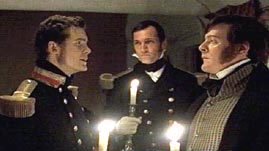Though his theory of natural selection was revolutionary, Darwin the man, by nature, was not. Born in 1809, he lived at a time when radical politics in Europe had provoked a conservative backlash and desire for stability. At the same time, the Industrial Revolution made change inevitable. New agricultural methods displaced poor farmers and brought great hardship to England's growing population, and many were clamoring for reform. Established elites, slow to accept radical changes, were wary of new ideas that challenged traditional views of the "natural order" and mankind's place within it.
Darwin's grandfather, Eramus, who died in 1802, was more the revolutionary type, with a far-reaching and unfettered mind. He supported the American and French revolutions, wrote erotic verse, and published prolifically on medicine and zoology. In his book
Zoonomia he even developed his own version of "transmutation," as evolution was then called. He did not, though, come up with a theory as earthshaking as his grandson would.
Charles Darwin was, in a word, respectable -- and wanted to remain so. He grew up an advantaged, upper-class young man, though with a growing passion for natural history -- not the parson's life for which he was trained. Darwin was invited on the five-year voyage of the Beagle to provide company for the aristocratic young Captain FitzRoy. (The rigid etiquette of the 19th century forbade the captain from dining with his own officers.) Darwin took advantage of the opportunity his travels provided to expand his knowledge of natural history.
Because his theories of evolution and natural selection were sure to disrupt his comfortable relationships with more traditionally minded people -- including his wife, Emma -- Darwin developed his ideas in private. He repeatedly delayed publishing his ideas, dreading the controversy they would generate, for the conclusions that his research had led him to draw were at odds with the dominant belief at the time: that God created all species in their present form, not that they had evolved through natural selection.
No question, many of the more conservative members of the church and the scientific establishment despised
On the Origin of Species when it was published in 1859. Darwin was roasted in caricatures in magazines. By contrast, rising young scientific stars embraced Darwin's ideas, and -- in contrast to the myth --
On the Origin of Species was taken very seriously by almost all commentators.


 Loading Standards
Loading Standards Teachers' Domain is proud to be a Pathways portal to the National Science Digital Library.
Teachers' Domain is proud to be a Pathways portal to the National Science Digital Library.
